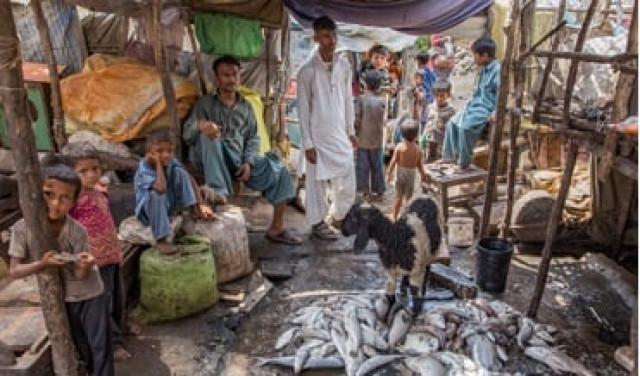Identity or education — how to break the cycle?
Activists debate how to relieve the plight of city’s stateless Bengali community

An online session on the plight of Karachi's 'non-citizens' raised on Saturday the question of what was needed more urgently for this hapless community - identity or education? Or rather, which of these would pave the way for the provision of the other?
As social and political activists from the city's identity-less Bengali community, which largely resides in Machhar Colony - one of the metropolis' biggest slums - joined the session titled 'Karachi's Invisible Communities: Voices from Machhar Colony', organised by The Second Floor and Imkaan Welfare Organisation, opposing views gave way to an interesting discourse on the plight of unregistered citizens.
Setting the ground for the discussion, Muhammad Shahid, an activist speaking particularly in relevance to the Bengali residents of Machhar Colony, stressed that two issues needed immediate attention at the moment.
"Identity and education," he elaborated. "Here, neither parents nor children have any identity. And so, our children cannot acquire education and cannot get any job," said Shahid, who often shares pictures from the down-trodden informal settlement on social media, depicting the abject condition of its residents. He ascribed these factors to the rising levels of stress among the youth.
Taking the dialogue forward, educationist Rashid Sardar, emphasising the importance of education, opined that government schools in the low-income locality were performing better than private schools.
"Some others and I are supporting three government schools as we want quality education [for Bengali-origin children]," he went on. "Give us education and we will prove our identity and be able to get our rights."
Muhammad Hussain Shaikh, a fishermen's activist, opposed Sardar's hypothesis. "Nothing is more important for the Bengali community than to get their identity first. Give us identity cards and we will survive on our own," he insisted. Shaikh further lamented that roughly 60 per cent of the port city's fishermen belonged to the stateless community but were not recognised by the state.
Other speakers, too, echoed the tale of the Bengali community's struggle for an identity for around 40 years.
"Our people do not have access to health facilities. They neither have jobs nor the right to education," deplored Rasheeda Khatoon, a councillor, who blamed the government for not even addressing the community's basic issues.
Earlier, Imkaan Welfare Organisation founder and director Tahera Hasan, who was moderating the session, pointed out that 68 per cent of Machhar Colony's population comprised stateless people of Bengali and Burmese origin.
"Being underprivileged and marginalised due to statelessness, they face major challenges even in their daily existence," she remarked.
Published in The Express Tribune, July 26th, 2020.



















COMMENTS
Comments are moderated and generally will be posted if they are on-topic and not abusive.
For more information, please see our Comments FAQ